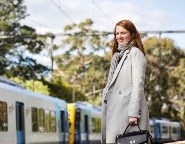In 2012, after six years at home raising my two kids, I decided I would need to go back to work in the near future. It was time to review my employment options.
Vision loss at the age of 24 had changed the course of my life. The undergraduate degree in film and television that I had completed when I was fully sighted, was no longer of much use or interest to me.
My current self, a legally blind solo mother of two ‘energetic’ young boys required a very different career path to that of film making.
My options, as I saw it, were plan A: apply for a job at my local bakery where I would prepare sandwiches and sell iced donuts or, plan B: ask my parents to babysit my children two nights a week, for two years, while I studied a Graduate Diploma in Public Relations.
After minor deliberations I chose plan B.
Education is not necessarily the key to success as high school dropout Paul Keating, among many other successful dropouts, can testify. However, as someone with a disability I knew that an education qualification would vastly increase my opportunities for meaningful employment, financial stability and greater social inclusion.
I applied for a Graduate Diploma in Public Relations and was accepted. Once the excitement of getting into my course had dissipated I worried about the logistics of studying as a person with low vision.
I looked into what life on campus with a disability would be like. I contacted student services and was referred to the university’s Disability Liaison Unit (DLU). The DLU was an impressive service. The staff provided great support and guidance however they had no funding to supply adaptive technology.
Almost the first thing my DLU officer did was recommend that I apply for a Further Education Bursary from Vision Australia. The idea that I could be given valuable adaptive technology to support me in my studies gave me a huge sense of relief and made the two years of study ahead feel achievable.
In the weeks that followed I applied for the bursary. At the same time, semester one of my course had started and I went to class with a pad and pen. I took copious notes that I couldn’t read back. I couldn’t see the PowerPoint presentations in my classes and the teacher only occasionally remembered to print me out a large print copy of the slides. Despite these less than perfect conditions I kept up with my assignments and passed each subject.
Soon after the semester finished I found out I’d been awarded a bursary. This meant that the remainder of my course would be a very different experience to the semester I’d just completed.
Things went from good to great when my laptop, docking station, high quality scanner, handheld CCTV and specialist software arrived. Oh happy days!
It’s worth noting that my grades improved soon after my adaptive equipment arrived. In my final three semesters I averaged high distinctions and never had to apply for an extension again.
The bursary provided me with the tools to thrive at university and I finished the Graduate Diploma in Public Relations in July 2014.
There were no more dinners consisting of packets of chips and coffee and no more standing on Swanston Street in the freezing wind waiting for the number 67 tram.
Had I decided against going back to university because it was all too hard to study with a disability I can’t think where I would have found work that was meaningful and had long-term prospects.
About Kate
After successfully completing a Graduate Diploma in Public Relations in 2014, Kate Begley volunteered as a communications assistant with Vision Australia. In 2015, she was accepted into Vision Australia’s Graduate Program and now works full-time at Vision Australia as a Policy Advisor, advocating for the blindness and low vision community.











